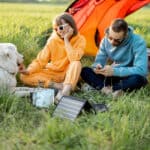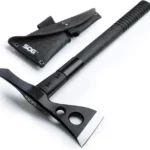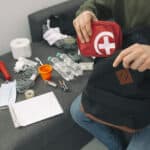Packing for a weekend in the wilderness can feel like preparing for a month-long expedition. Surprisingly, most camping trips don’t require as much gear as we think. This article will guide you through selecting essential items that ensure comfort without overloading your backpack.
Dive in to lighten your load and amplify your adventure!
Table of Contents
- Selecting Lightweight Clothing for Camping
- Essential Camping Tools and Gadgets
- Packing Efficiently: One-Bag Camping Approach
- Essential Toiletries and First Aid for Camping
- Food and Hydration Essentials for Camping
- Can the Same Packing Techniques be Applied for Long-Distance Hiking and Weekend Camping Trips?
- How Can I Pack Light for a Camping Trip and Still Ensure I Have Enough Water?
- Conclusion
Key Takeaways
- Dress in layers with versatile clothing like zip-off pants and synthetic materials to manage changing temperatures without overpacking.
- Pack essential tools such as a multi-tool, headlamp, portable stove, and a lightweight tent to stay prepared while saving space.
- Choose a one-bag camping approach focusing on multipurpose items and using compression sacks to maximize backpack space efficiently.
- Include crucial toiletries like biodegradable soap and a compact first aid kit for personal hygiene and minor medical needs.
- Bring nonperishable food items for energy, carry more water than expected, and use portable filters or hydration packs for safe drinking water.
Selecting Lightweight Clothing for Camping
Now that we’ve introduced the concept of minimalist camping, let’s delve into how you can select lightweight clothing that won’t weigh you down. Choosing the right attire is crucial for comfort and mobility on your outdoor adventure.
- Opt for versatile layers: Dressing in layers allows you to adjust as temperatures change. Start with moisture-wicking fabrics close to your skin, add insulation like a fleece jacket, and top it off with a waterproof outer layer.
- Embrace synthetic materials: Synthetic fibers such as nylon and polyester are light and dry quickly if they get wet, making them ideal for camping apparel. Avoid cotton, which takes longer to dry and can leave you feeling cold and damp.
- Select convertible clothing: Items such as zip-off pants convert to shorts and are perfect for camping trips where weather conditions may vary throughout the day.
- Focus on multifunctional items: Choose garments that can serve multiple purposes. A bandana, for example, can be a neck warmer, a makeshift towel, or even a pot holder.
- Prioritize dark clothing: Darker clothes hide dirt better than light colors, meaning they require less washing and can be worn multiple times before needing to be cleaned.
- Use compression sacks: To save space in your backpack or bag, use compression sacks to shrink down bulky items like jackets or pants without adding extra weight.
- Follow the one-shirt-per-day rule: Limit yourself to one shirt per day of your trip; it’s an effective way to reduce bulk in your bag while still having fresh clothes daily.
- Choose a compact sleeping bag: A lightweight sleeping bag designed for backpacking will take up less room and make carrying your gear much easier at campgrounds or backcountry campsites.
Essential Camping Tools and Gadgets
Essential camping tools and gadgets help make your outdoor experience smoother and safer. They are the high-tech companions that ensure you stay comfortable, fed, and on the right path throughout your adventure. Here’s what to pack:
- A reliable multi-tool, which serves numerous functions in a compact form, is indispensable for quick fixes and unexpected needs around the campsite.
- Headlamps or hands-free flashlights provide illumination while keeping your hands free for tasks in the dark.
- A portable stove and fuel canisters allow you to cook meals without relying on a campfire. This is crucial for areas with fire restrictions or unfavorable weather conditions.
- Lightweight, durable cookware designed for camping saves space and withstands rough handling during transport and use.
- A sturdy yet lightweight tent ensures you have a safe haven from the elements without adding too much weight to your backpack.
- Sleeping bags suited to the season’s temperatures guarantee warmth and comfort through chilly outdoor nights.
- An inflatable sleeping pad offers cushioning from the hard ground, helping you get a good night’s sleep after an exhausting day of hiking or exploring.
- Navigation tools such as a compass or GPS device are essential to maintain your bearings in unfamiliar terrain, especially where cell service may be unreliable.
- Duct tape is a versatile repair tool that can fix tears in gear, seal leaky tents, and even serve as makeshift bandages in emergencies.
- Water purification methods, like tablets or filters, secure access to safe drinking water no matter where you set up camp.
Packing Efficiently: One-Bag Camping Approach
Embrace the one-bag camping approach to transform your outdoor experience into a seamless adventure. Targeting this method means cutting clutter and focusing on multipurpose items that serve several needs.
Start with a sturdy yet lightweight backpack, ensuring it fits comfortably and offers enough compartments for organization. Choose versatile clothing such as zip-off trousers and layerable shirts, which can adapt to changing weather without taking up too much space.
Pack multi-use gear like a spork instead of separate cutlery, a compact sleeping bag suitable for various temperatures, and a lightweight tent with easy setup features. Prioritize items based on activities planned; for instance, if car camping is part of your trip, you might opt for collapsible chairs or portable grills that can be shared among fellow campers.
Opt for biodegradable soap rather than multiple cleaning products—it’s kinder to the environment and saves room in your pack. Roll clothes rather than folding them to maximize space and use compression sacks where possible to shrink down bulky items like sleeping bags or jackets.
This strategic approach lightens your load and simplifies setting up and breaking down campouts, making the great outdoors feel even greater.
Essential Toiletries and First Aid for Camping
Keeping clean and prepared for minor injuries is crucial when camping. Include these toiletries and first aid items to ensure you’re ready for anything.
- Pack a small tube of toothpaste and a folding toothbrush to maintain oral hygiene without adding much weight.
- Bring biodegradable soap that can safely be used outdoors, keeping you and the environment clean.
- Opt for travel-sized shampoo and conditioner containers if planning to shower at camp facilities.
- Include a roll of toilet paper in a plastic bag to keep it dry; consider a compact travel version or remove the center tube to save space.
- A small quick-dry towel is versatile for cleaning up or drying off after swimming or showering.
- Assemble a kit with various-sized bandages, perfect for covering various cuts and scrapes.
- Add antiseptic wipes and cream to your kit to prevent infections from any injuries you might sustain.
- Pain relievers like ibuprofen can help manage headaches or body pains after an active day outdoors.
- Tweezers are necessary for removing splinters, ticks, or other small debris that may get under the skin.
- Wrap some medical tape around a short pencil instead of bringing a whole roll; it saves space and is just as effective.
Food and Hydration Essentials for Camping
After gearing up with toiletries and first aid, focusing on nourishment is key. No camping trip is complete without the right food and plenty of water to stay energized and hydrated.
Opt for non-perishable items like nuts, granola bars, and dried fruits that pack a nutritious punch without weighing down your backpack. Whole-grain sandwiches with a spread of peanut butter or a slice of cheese offer lasting energy – perfect for those long hikes.
Always bring more water than you think you’ll need; it’s crucial to stay safe outdoors. Consider packing a lightweight, portable water filter to turn streams into drinkable sources—this way, you carry less while ensuring access to clean water.
Hydration packs are also excellent for keeping hands free on the go, allowing easy sips without stopping your adventure to rummage through gear. Remembering these essentials will help you maintain peak conditions throughout your journey under the stars.
Can the Same Packing Techniques be Applied for Long-Distance Hiking and Weekend Camping Trips?
When it comes to packing for long-distance hiking versus weekend camping trips, the same techniques may not always apply. For long-distance hiking, focusing on lightweight, compact gear is essential. However, for weekend camping trips, you may have the luxury of bringing more comfort items. So, flexibility is key when it comes to packing for long-distance hiking.
How Can I Pack Light for a Camping Trip and Still Ensure I Have Enough Water?
When packing light for a camping trip, consider using rainwater collection techniques to ensure you have enough water. Utilize lightweight, collapsible containers to collect rainwater, and bring a portable water filter or purifier for safe drinking. This way, you can stay hydrated without carrying extra weight.
Conclusion
Embracing minimalist camping lets you focus on the adventure, not your gear. Pack smart and enjoy nature’s simplicity with essentials that cover your needs without weighing you down.
Remember to scrutinize each item for its true necessity—less is often more in the wild. With the right preparation, a weekend under the stars becomes uncomplicated and deeply rewarding.
Venture out confidently, knowing you have everything essential tucked in one bag; let nature do the rest.




![Campings Light [4 Pack] Doukey Portable Camping Lantern Bulb LED Tent Lanterns Emergency Light Camping Essentials Tent Accessories LED Lantern for Backpacking Camping Hiking Hurricane Outage](https://m.media-amazon.com/images/I/41RgSzKMbpL._SL160_.jpg)















Leave a Reply